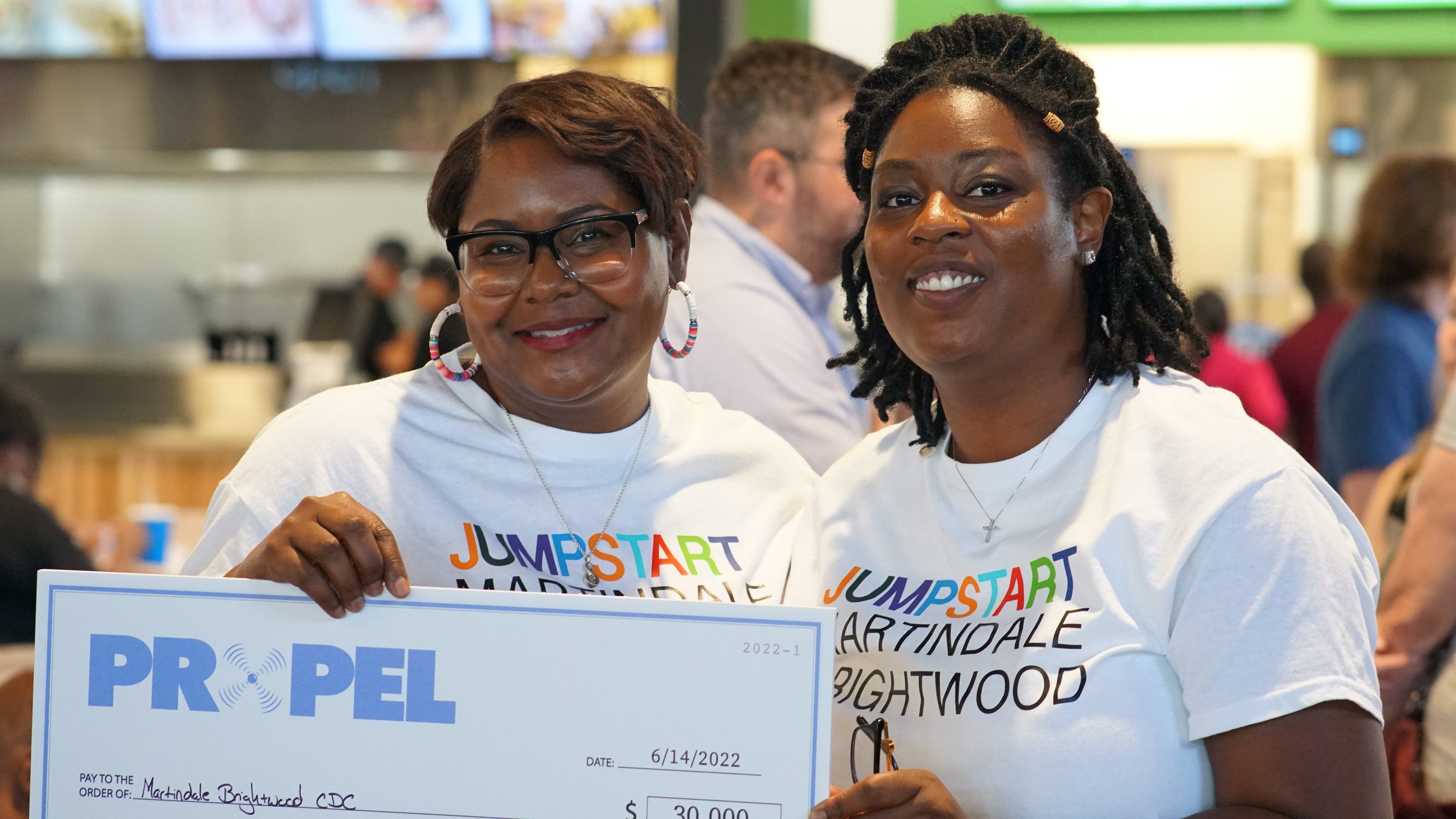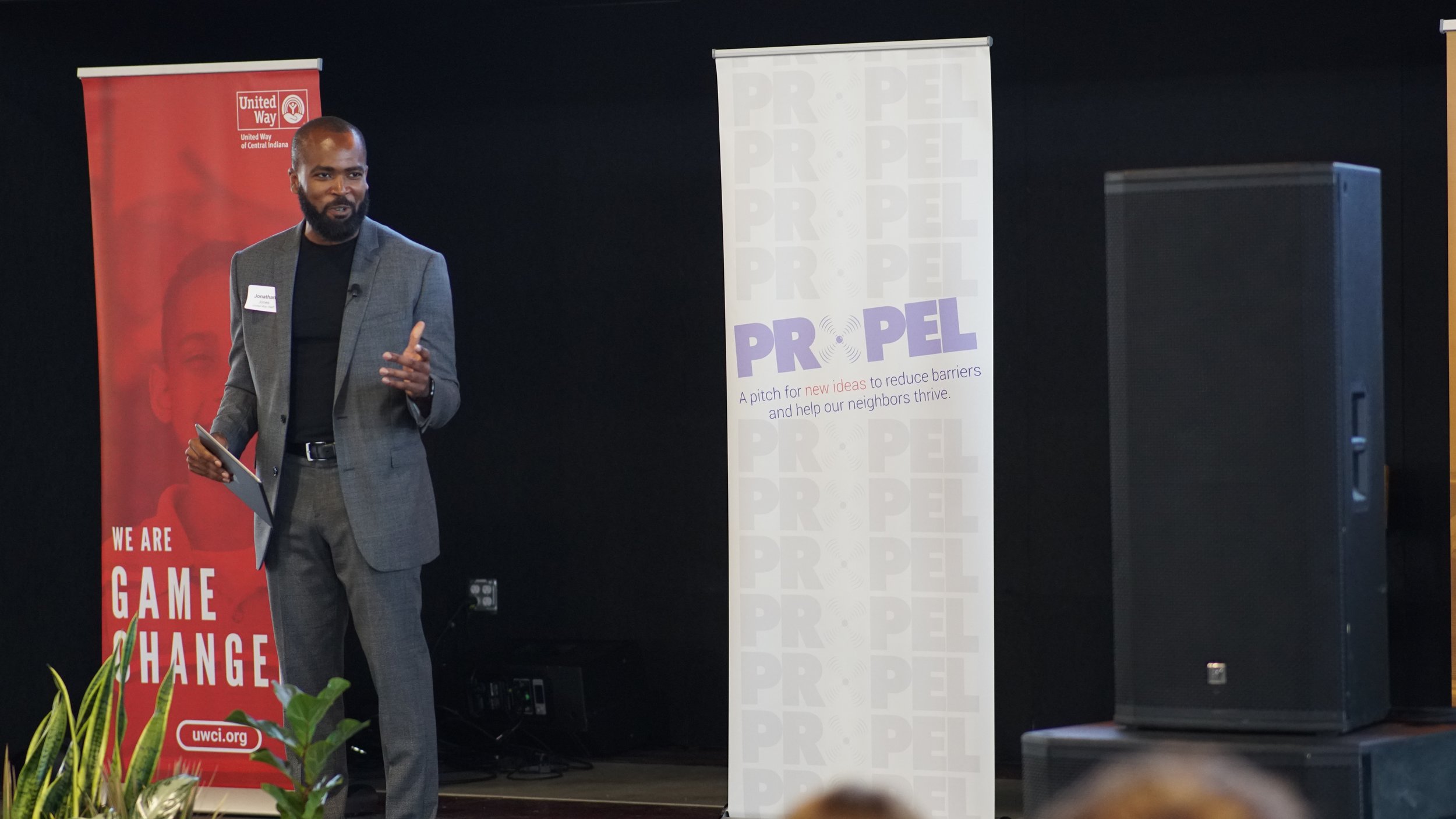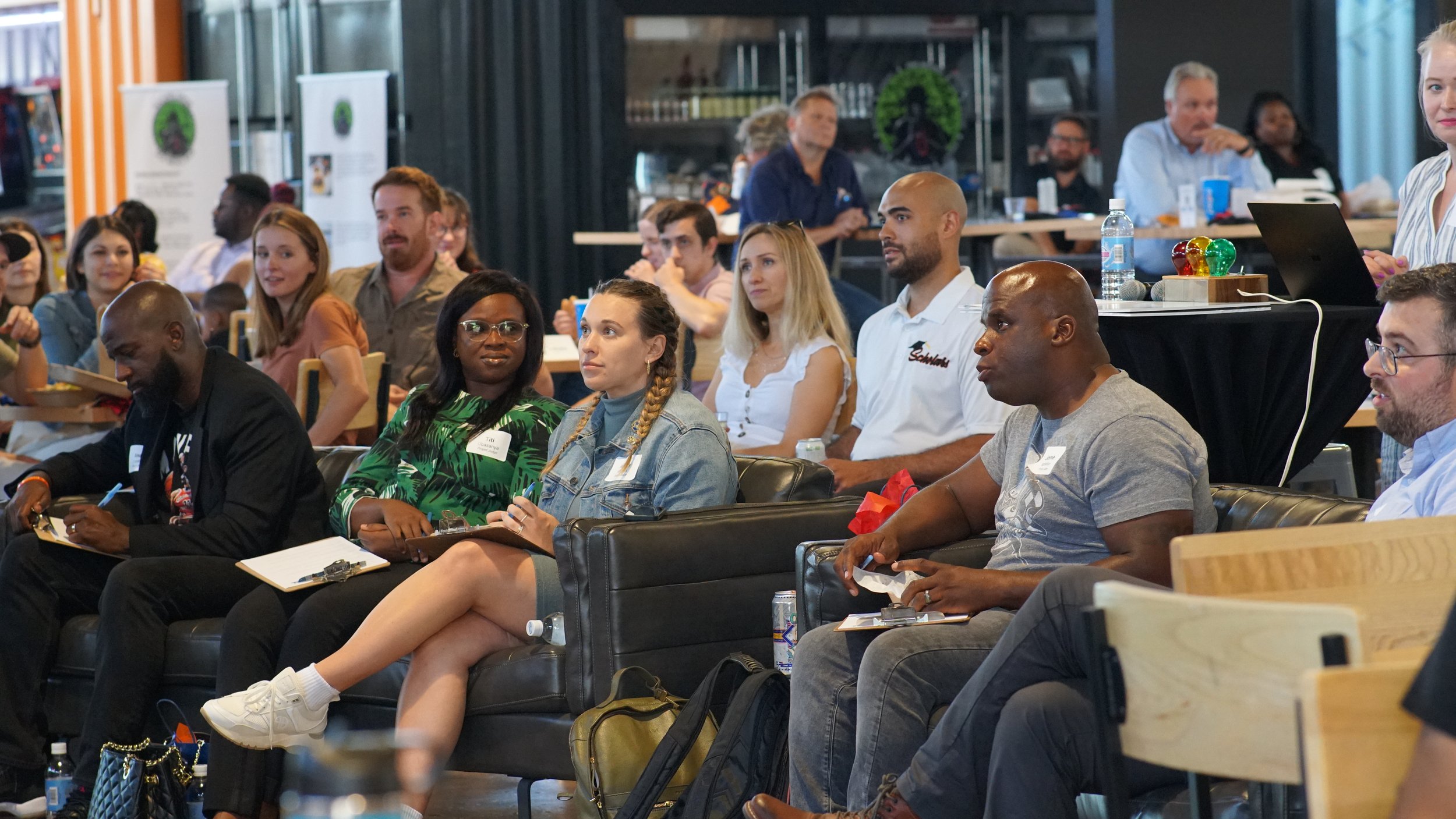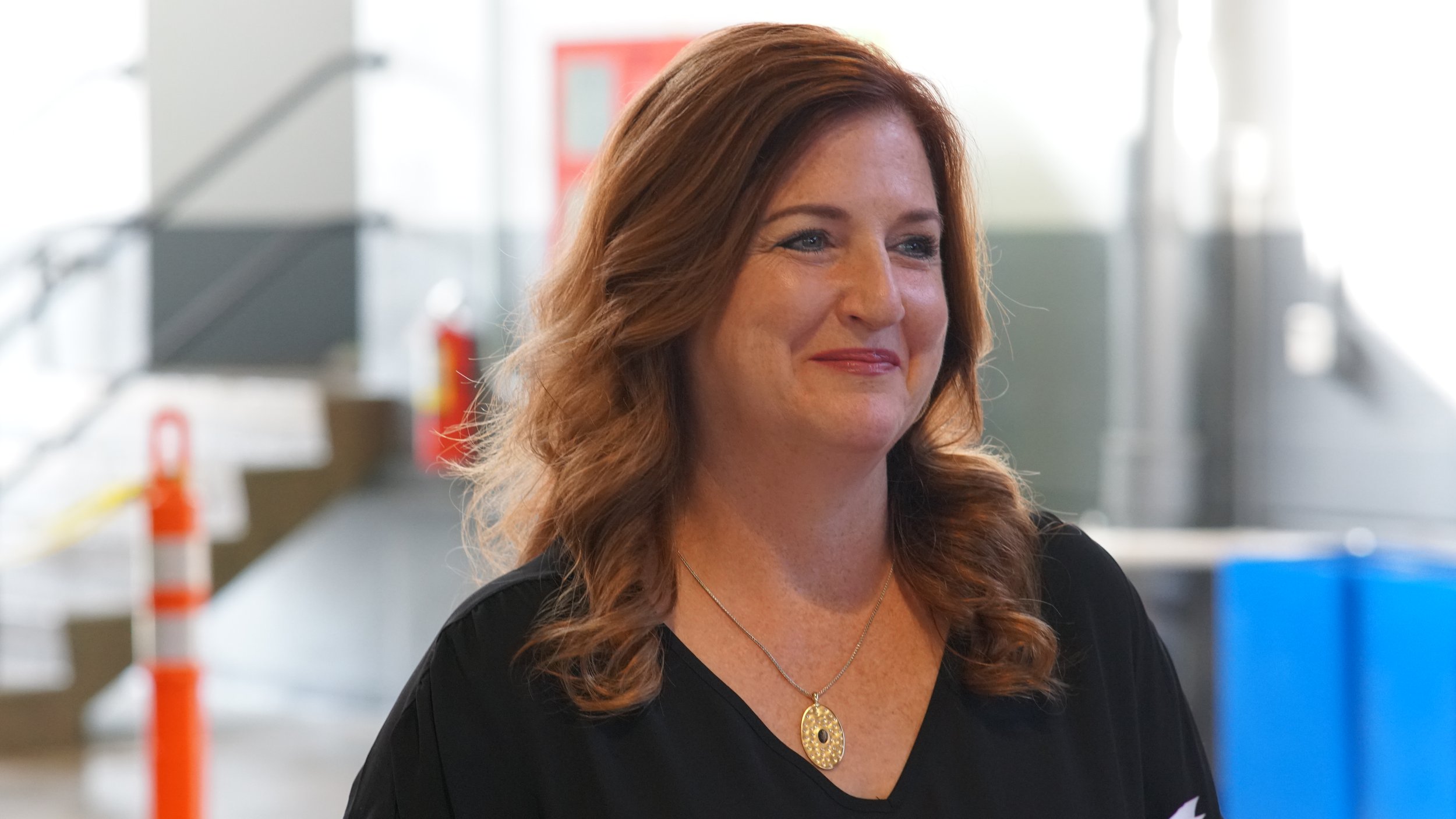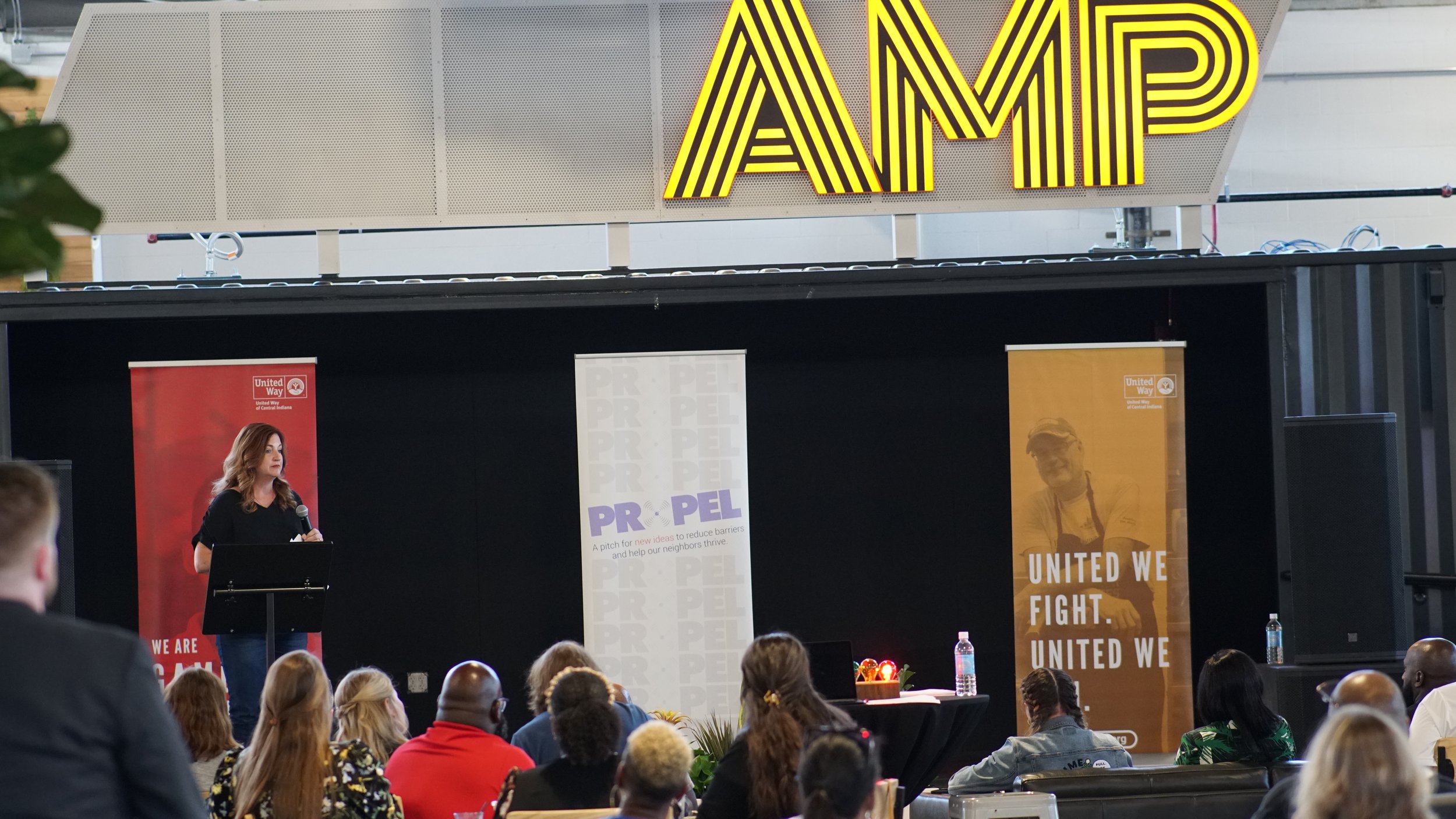'It’s opened up so many doors’: How a United Way pitch contest helped organizations launch new projects, make connections
One day last spring, three leaders of Martindale Brightwood Community Development Corporation walked the sidewalks of the neighborhood and pressed record on a video.
In the five-minute recording, they explained the vision for their project.
With Jumpstart Martindale Brightwood, they hoped to launch a program to train and mentor emerging minority real estate developers interested in improving and investing in the neighborhood. Among the goals: Create opportunity for people of color who have been underrepresented in the real estate development industry and ultimately create affordable housing options so families can stay in the neighborhood and build wealth through homeownership.
The video was all for a submission to Propel, a United Way of Central Indiana pitch contest for human services organizations.
Nearly 30 nonprofits applied by video, and the pool was narrowed to five finalists invited to pitch their ideas live for a chance to win $30,000 in funding.
On June 14, 2022, Dr. JoAnna Brown and Joi Harmon took the stage at The AMP at 16 Tech to make their pitch for Martindale Brightwood.
They were nervous. They’d never pitched at a competition before.
Before them sat a panel of judges and a series of three lightbulbs – green, yellow, red – indicating how much time was left in their five-minute pitch.
After all the finalists had gone, the judges announced their winner: Martindale Brightwood Community Development Corporation.
Brown and Harmon leapt in the air, arms above their heads. “I think I didn’t even go to sleep that night,” Brown said.
“To have staff, board members – and even our family – to be a part of the experience in the audience, to look out and say, ‘We did it, we’re bringing this opportunity back to the community that’s going to have a lasting impact’ – that's immeasurable, really,” said Harmon, the organization’s deputy director.
Much has happened since.
Both Martindale Brightwood Community Development Corporation and Gennesaret Free Clinics, a Propel finalist, received funding from United Way’s Social Innovation fund in November 2022. And Propel itself has grown: A second iteration of the event, sponsored by Audiochuck, was held in April 2023, with more than $100,000 awarded to nonprofits.
“Since pitching on stage at Propel, these organizations have not only been able to impact community, but … the community has also wrapped around these organizations and their initiatives to increase the amount of impact that they’ve been able to have with our neighbors,” said Jonathan Jones, United Way’s social innovation senior director.
For Gennesaret Free Clinics, a connection made through Propel led to the organization receiving its single largest donation to date.
And for Martindale Brightwood, winning Propel meant bringing to life a longtime vision for the community: “This has been our passion project for the last couple years, to see more people who look like me at the table when it comes to real estate development in our communities,” said Brown, housing and development officer.
“... I've been thankful for this whole process since we won – and beyond – because I feel like it’s opened up so many doors I didn’t even realize it was going to open up for us.”
A ‘life-changing’ connection
Theresa Patterson felt like she’d flubbed.
The executive director of Gennesaret Free Clinics pitched at Propel, holding a microphone, a clicker for her PowerPoint presentation and a prepared speech in her hands.
The speech fell on the ground. Gennesaret didn’t win.
Patterson felt like she’d let down the people she was trying to serve. She slunk away and licked her wounds, she said, but there was important work to get back to.
A couple months later, Jones from United Way connected her with Propel sponsor and media company Audiochuck, whose team wanted to learn more about Gennesaret.
The nonprofit works to ensure all who live in Indianapolis have access to high-quality, respectful and barrier-free health care. They do that by operating free medical clinics, a dental clinic, a women’s health services clinic and three health respite homes to provide a safe place for those experiencing homelessness to stay when they’re coming out of the hospital.
Gennesaret focuses on three zip codes in particular – 46218, 46201, 46225 – where residents have a life expectancy 15 years shorter than those who live outside those zip codes, according to data from IUPUI’s Richard M. Fairbanks School of Public Health.
Patterson met with Audiochuck’s top leaders and outlined Gennesaret’s vision: to launch a hub-and-spoke clinical model. The goal was to keep the hub clinic – located at St. Vincent de Paul Food Pantry in Indianapolis – open more days a week so people could have greater access to care and expand the “spoke” part of the model, taking the mobile medical unit out into the community on a more regular schedule.
Then, Ashley Flowers, Audiochuck’s founder and chief creative officer, told Patterson something she wasn’t expecting.
“She told us that she was going to give us $1 million to support our work,” Patterson said. “I went from dropping my speech at Propel to her supporting us with an amazing million-dollar grant.”
It was the single largest gift Gennesaret has received, one Patterson called “life-changing.”
The funding has allowed Gennesaret to remodel and open its hub clinic Monday through Saturday, run its women’s health services clinic weekly instead of every three weeks and purchase a new mobile medical clinic. The funding also has allowed Gennesaret to think about how to right-size its respite program to serve more people.
“What an incredible gift,” Patterson said. “And it started because of Propel.”
Building community ‘from the inside out’
When leaders at Martindale Brightwood Community Development Corporation heard about Propel, stars aligned, their executive director said.
The organization already had a program they wanted to launch – Jumpstart. And Propel was looking for innovative projects, ones that would reduce barriers for those from under-resourced communities and asset-limited backgrounds.
“It just fit perfectly,” said Executive Director Amina Pierson.
For 30 years, the nonprofit has worked to be a catalyst for sustainable growth in Martindale Brightwood and the surrounding areas, Pierson said. It does that through education, housing, empowerment and community development, which includes developing small businesses and people in the neighborhood.
Keith Broadnax, senior vice president of business development for the nonprofit Cinnaire, brought the idea for Jumpstart to Martindale Brightwood.
This is the need: Black developers have been historically underrepresented in the real estate development industry, making up less than a quarter of the developers in the country, according to figures Brown has cited in research and proposals. Women make up even less than that.
“There’s a huge deficit when we talk about minorities in real estate development space,” said Brown, who started her career in urban planning and moved into housing market analysis. “I got tired of being the only minority in the room, the only woman in the room. And so I said, ‘We have to do something about this.’”
Pierson explained in the initial Propel pitch video that she sees a lot of housing going up in the neighborhood, which is composed of 95% people of color, but it’s not coming from local developers. It’s outside investors and larger companies building market-rate housing, despite the desire from residents for affordable housing for families.
Jumpstart is a way to build the community “from the inside out,” she said: “There’s never been money put into a neighborhood like Martindale Brightwood to say, ‘Let’s find talent. Let’s see who has the aptitude to do this.’”
Over six weeks, the program introduces participants to different disciplines within real estate development and provides training in the development process, from acquiring and sourcing property to financing to property management. It’s modeled after Jumpstart programs in Wilmington, Delaware, and Philadelphia’s Germantown neighborhood.
When it came to Propel, Harmon said the video application and pitching live on stage provided a creative, fun way to share their story and vision for Jumpstart – and be their authentic selves.
“This application process allowed us to show our passion for the project, show our commitment to the community in a different way that doesn’t come across on paper,” added Brown.
After winning Propel, Martindale Brightwood Community Development Corporation launched Jumpstart and put out a call for applications, hoping to get a couple dozen.
More than 140 people applied.
They graduated their first cohort of 25 participants in November. Less than two months later, at least four of the graduates had already landed jobs with developers.
Pierson said launching Jumpstart has turned a spotlight on the nonprofit. It’s led to partnerships with other agencies and is already having regional impact, with graduates taking their new knowledge and skillset into other communities. Westside Community Development Corporation also participated in the program.
Jumpstart will start its second cohort in August, with applications opening in May.
Cinnaire, which partnered with Martindale Brightwood to bring the program to the neighborhood, is now setting up a pre-development fund for all Jumpstart graduates, Broadnax said. Funding and access to capital can be significant barriers for developers, and this will provide them with affordable, below-market-rate financing, he said.
Perhaps one of the most significant outcomes: The relationships participants have built with each other and their mentors will likely last throughout their career – and lead them to new opportunities, Brown said.
Broadnax said that, as one of the few African Americans in real estate finance, emerging developers will come to him with their struggles, feeling unprepared and unsure about why they got turned down by the bank. With 30 years of experience, Broadnax knows what it takes to get approved.
Jumpstart is a way for him to teach what he’s learned in his career, to give opportunities to those who haven’t had access, he said: “I wanted to be able to show … them the right way to do real estate development.”

